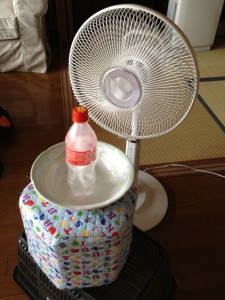business eikaiwa kids school management study trips summer camp young learners
by sendaiben
leave a comment
Eikaiwa School Field Trips: Summer at the Zoo
Every year we organize some kind of optional summer event for our students. Past events have included ice skating (feels weird to put on sweaters and gloves in August!), outdoor games, playing in a river, and trips to the seaside. This year we decided to go to Yagiyama Zoo in Sendai with our preschool- and elementary school-aged students.
Before the trip we visited the zoo to plan out routes and activities, bought small sketchbooks for all the students, divided them into groups and assigned teachers to lead each group.
There was a slight problem with the timing of the announcement coinciding with the school being closed for some classes, so that some parents only got the announcement letter after the trip was full! We did our best to accommodate them which led to us needing a larger bus and the groups getting a bit too big for the number of teachers we had (several were away due to the summer holidays).
Then the day before the excursion the weather reports changed from sunny with cloudy spells to rain (60%). Then that evening rain (70%). The next morning the ground was wet when we woke up at six am, but by seven it was raining. By eight thirty (the deadline for making a decision) it was raining heavily.
Fortunately we had a plan B. We had made arrangements to go to the aquarium at Matsushima in the event of rain. This was not ideal, but preferable to cancelling and being out of pocket for the bus hire and other expenses.
The problem with the aquarium is that we hadn’t had time to visit and make plans. It was also much more expensive than the zoo, and smaller. We weren’t sure if there was enough to do there for the four hours we had planned.
Lessons Learned
We learned a lot from this year’s trip. Here are some of the most important things:
1. Having a plan B is essential if weather could impact on your trip. What were the chances of the only rainy day for weeks and weeks being the day we were going to the zoo? Because we had a plan B and had told the students and parents about it our trip wasn’t ruined. However, we should have put more time into getting ready for plan B.
2. Accurately estimating demand, making sure the sign-up process is fair to everyone, and sticking to deadlines and limits on numbers of students is important. We didn’t have any major problems this time, but the large numbers of students made things more difficult for our teachers (I found myself supervising sixteen young children for much of the day, and it was too many for comfort).
3. The number of seats quoted by bus companies include those fold-down seats in the middle. I don’t like them because they are uncomfortable, seem less safe, and mean that it is not possible for teachers to move around the bus when they are in use. In the future, I would like to make sure all the students have a proper seat, with only teachers in the middle seats if necessary.
Conclusion
In the end the trip turned out well. The aquarium had just enough to keep us busy (looking at the fish, drawing pictures, watching the sealion show, shaking hands with a sealion, meeting baby turtles, wading in a big pool, etc.). It was also great that they had a large seating area that wasn’t at all busy, so we could sit the students down in groups and talk to them, have them draw pictures, and eat lunch in an orderly fashion.
I think we were both unlucky (the weather) and lucky (everything turned out fine and the students enjoyed themselves). We also got a few insights for next year.
Does anyone else do field trips?
blogging earthquake expectations life in Japan living in Japan personal refugee
by sendaiben
leave a comment
Shock Therapy: how a geological event helped cement my minimalist leanings
This post was originally written for an ebook project that never happened. I’m happy to publish it here now.
Are you a wannabe minimalist? I was. It took a major natural disaster to change that.
I became interested in a minimalist lifestyle a couple of years ago. It started with Leo Babauta and Zen Habits, and progressed to Karol, Tynan, Baker, and others. It was appealing, and I spent hours reading articles, following blogs, looking at lists of possessions and checking out minimalist workspaces.
I didn’t actually do anything to change my life, but it was fun thinking about it.
I guess I had the desire but not the drive, the talk but not the walk. I suspect this may be very common, with a small core of people actually living a minimalist lifestyle, and a wider circle of spectators seeing the benefit but not taking action.
This all changed in March 2011. I was just getting ready to teach on an ordinary Friday afternoon when the fourth largest earthquake in recorded history hit the city I live in, doing substantial damage in itself and causing a devastating tsunami. Luckily my seven year-old students hadn’t arrived at the classroom yet, so I didn’t have to worry about them being hurt when everything in the room flew five feet sideways, including computers, tables, and bookshelves.
The earthquake lasted for about five minutes, which is about four and a half minutes too long for comfort. We’re used to earthquakes here, but they normally only last a few seconds. This one started, then got stronger and stronger, and everything just kept violently shaking for what seemed like forever.
After it finally stopped, I left the classroom and checked on some of our neighbors, then stood in a nearby park with other members of the community, all of us shocked into silence.
That evening I sat with my family in our large rental house by candlelight, surrounded by electrical appliances that no longer worked, huddling together for warmth under all our blankets and quilts.
The next day we foraged for food. Going through my daughter’s apartment, taking only food and water and leaving CDs, magazines, clothes, TVs, and furniture behind really made an impression on me. Likewise when we found all the shops closed and shuttered. Gas stations, chained up. Didn’t matter how good your credit was, how much money you had in your wallet.
We’re all just a couple of hours away from that.
That night, back at home taking stock, we received a couple of phone calls from friends and family abroad (I have no idea how they got through as the phone network was down) warning us about the unfolding nuclear accident in Fukushima. We live just under 100km away.
I made a quick decision based on a decision matrix taking into account what would happen under each of four scenarios: there were two variables, whether the accident was serious or not, and whether we left or not. The outcomes were, in turn:
1. the accident was not serious, and we stayed put: nothing happens
2. the accident was not serious, and we ran away: somewhat embarrassing and would cost some money
3. the accident was serious, and we stayed put: irradiation and mass panic when people realised what was happening
4. the accident was serious, and we ran away: safety and some monetary expense
There wasn’t much contest. I persuaded my family, we packed our cars, and we set off a couple of hours later, driving through the night and most of the next day until we got to relative safety in western Japan, several hundred kilometers and a mountain range away from the danger zone.
I locked our house and walked away from everything I owned that didn’t fit into a small bag. We got into the car and left forever as far as we knew.
And you know what? I didn’t care about any of it. For the four weeks we spent with relatives in Kanazawa, on the western coast of Japan, not once did I think of an actual thing we had left behind. Family? We took everyone with us. Friends? Yes. Students? Yes. Our stuff? Not once.
Not one piece of clothing, not one gadget, not one room of the (too) large house we rented.
And that’s when I became a real minimalist.
Just over two years after the event that changed everything, we are living in a small apartment (our rental house was structurally damaged and had to be knocked down), I haven’t bought anything physical for months (sadly, ebooks and music still draw my eye occasionally -I am not yet a digital minimalist), and I am consciously reducing the things I have left.
The next time we have to leave in the middle of the night, I’m hoping to be able to take everything with me.
business Kindle materials online resources personal publishing
by sendaiben
4 comments
Self-publishing on Kindle
Last weekend I did something I have been meaning to do for a long time: I sat down and wrote a short book, edited and formatted it, and published it on Kindle through Amazon.
It really was that easy.
The process is extremely clear and Amazon has several tutorials to walk you through how to sign up, format your work, and upload it to the site. Once you have finished they check it (takes 12-48 hours) and then it goes live and people rush to buy it… or not, in my case 🙂
The book(let) is called Air Miles and Hotel Points in Japan, and it’s available free in any Amazon Kindle store worldwide for the next 24 hours or so. Please check it out if you are interested, and if you are feeling particularly generous you could leave an honest review.
The thing is, if you have been sitting on an idea for a novel or a non-fiction book, why not go ahead and put it out there? I’ll be happy to help if you have any questions.
life in Japan living in Japan materials personal technology
by sendaiben
2 comments
Summer tip: use a fan and ice instead of air conditioning
This post is dedicated to my friend Philip, ’cause he needs it right now 😉
This summer has been fairly mild in Sendai, but the last couple of weeks have been hotter. I don’t like air conditioning and prefer to use a combination of other strategies to stay cool outside of work. At home I wear as little as possible, sleep on bamboo sheets (one of the greatest inventions ever), and use an electric fan.
One way to make an electric fan more effective is to combine it with ice. This has two benefits: it takes some of the moisture out of the air through condensation and also lowers the temperature of the air slightly. You can see my setup in the picture above. A plastic bottle 2/3 full of water, frozen, a bowl to catch the condensation (this bottle accumulates a couple of centimeters of water in the bowl by the time it thaws out completely), and something to raise the bowl so that it is in front of the fan.
If you prepare three or four bottles you can rotate them fairly constantly and maintain a more pleasant environment without the expense, environmental damage, and air quality degradation of air conditioning.
Any other tips for the summer?
English speech contests
I have a new policy regarding English speech competitions (actually it’s an old policy, from earlier in the year) and I just wanted to make it public here along with the thinking behind it.
On many occasions in the past I have helped out with English speech contests and similar competitive events, as a coach, a judge, and even an organizer (the Miyagi Skit Koshien). However, I have never been completely comfortable with them, and recently have even begun to find them harmful.
I don’t believe competitive events are helpful to most language students. Yes, they can encourage students to spend a lot of time practicing, but the practice as it stands is not particularly useful (memorizing and repeating a speech ad nauseam). The winner-take-all nature of most contests is positive for the student that wins, and mostly negative for all the other students.
The sheer arbitrary nature of the judging decisions can make this worse (I have been on judging panels where students were disqualified because their school won the previous year, because it would be bad to give prizes to two students from the same school, or because one of the judges didn’t like the subject matter of their speech).
Add to this the strong suspicion I have that almost none of the students are writing their own speeches (and even if they do, they have no chance of winning), the disappointing contrast between the students when they are on stage giving their polished performance and after the event when they can’t seem to string two words together in English, and the slightly racist policies that bar students with non-Japanese family members (even non-English speaking ones!) from taking part and the whole circus just starts sitting wrong with me.
Finally, I don’t actually enjoy judging speeches and recitations. Some of the speeches can be interesting, but the pressure to rank the competitors and think of something intelligent to say in the final remarks takes away a lot of the pleasure.
Due to all of this, and because I haven’t found that taking part improves my life in any way, I will no longer be accepting invitations to be involved with competitive English events of any type.
However, I would like to see non-competitive events, like performance evenings or talent shows, become more widespread.
What do you think? Am I being too hasty in dismissing English contests?




